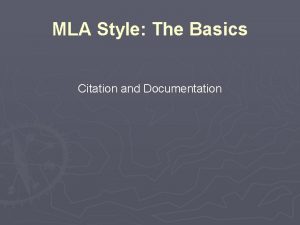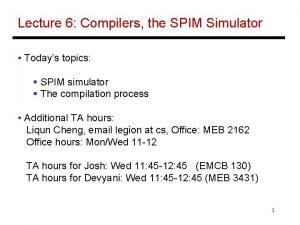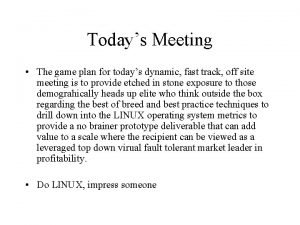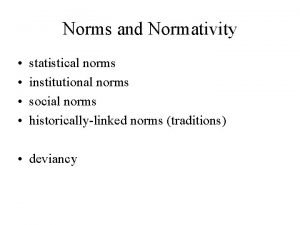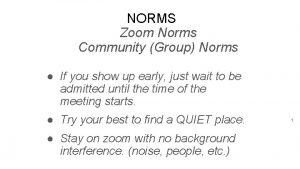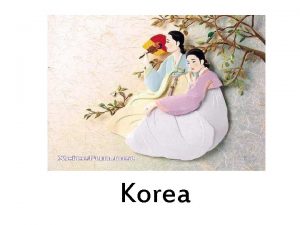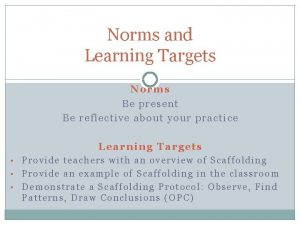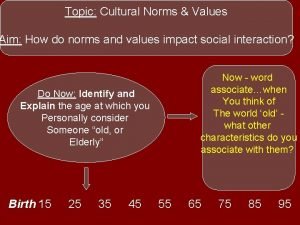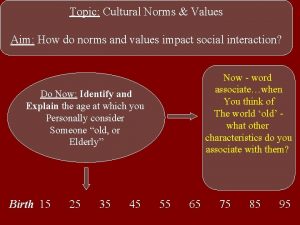Norms in Korea Lecture Dr RANSOOK KANG Todays



































- Slides: 35

Norms in Korea Lecture Dr. RANSOOK KANG

Today’s outline 1. 2. 3. 4. 5. What is culture? To understand intercultural communication Cultural distance The Korean Norms Discussion about today’s topic * The following resource was taken from Youtube and goolge *

What is culture? ‘Shared values’ ‘Belief’ ‘Behaviors of group of interacting people’ https: //www. youtube. com/watch? v=57 KW 6 RO 8 Rcs&feature=youtube_g data_player

Sapir-Whorf Hypothesis 1. there are certain thoughts of an individual in one language that cannot be understood by those who live in another language. 2. The way people think is strongly affected by their native languages.

Intercultural Context I / Self Familiar My home culture You / Other Unfamiliar Cultural overlap “Other” home culture http: //www. youtube. com/watch? v=PSt_op 3 f. Qck

Cultures High Context : Korea, Japan, Chinese. . - Infer most information from context. Convey little information explicity. Prefer indirectness, Politeness, Ambiguity. Consider oral argument more binding than written cues. Rely heavily on non-verbal sign. Low Context : Europe, America. . - Rely little on context. - Spell out most information. - Value directness : may see indirectness as dishonest or manipulative. - Value written words more than oral statement.

High Context & Low Context http: //www. youtube. com/watch? v=8 t. IUil. YX 56 E&feature=youtube_gdata_player High context messages : http: //www. youtube. com/watch? v=Gz. I 7 z 50 f. UPQ Low context messages : http: //www. youtube. com/watch? v=_xp-c. Fysb 2 w

Why do we have to know Korean Norms?

Relationship Korea with Japan “So near(close) and yet so far”

Cultural difference http: //www. youtube. com/watch? v=Ynis. XK_Uf. Ts&feature=youtube_gdata_player http: //www. youtube. com/watch? v=Z 6 SGz 2 kita. A&feature=youtube_gdata_player

Group discussion “Let’s think about difference between Korean , Japanese and Chinese ? ” Also, “What are similar, Korean culture and Japanese culture? ” (For 3 minutes)

KOREAN NORMS “Norms” rules, guides and standards of conduct ; they determine acceptable behaviors. ‘Prescriptive and proscriptive norms. ’ <Question> Do you know any Korean norms?

Manner https: //www. youtube. com/watch? v=xx. Nqrtncw 60&feature=youtube_gdata_player http: //www. youtube. com/watch? v=AIk. ZKNv 0 F 7 M&feature=youtube_gdata_player http: //www. youtube. com/watch? v=bq 0 y. Om 55 y. AE&feature=youtube_gdata_player http: //www. youtube. com/watch? v=c. FQFp 05 Twww&feature=youtube_gdata_player

Bow to greet each other (except with the same-aged friends)

Subordinates must greet or bow to superiors first; subordinates have to bow deeper to superiors.

Use honorific in speaking to strangers, older people, superiors, etc.

Practically everyone is called by his or her title, including older siblings and cousins, except the same-aged friends.

Do not use red ink in writing a person’s name.

Pass or receive objects with both hands.

Do not sit on the doorstep “ Block off a passage “

Do not shake a leg while sitting.

Do not sit at corners of the table.

Do not hit someone in the head

Pillows should not be left standing (if you do, burglars may come) Young people don’t smoke in front of older people. Women should not smoke in public.

Turning sideways when drinking alcohol in front of an older person.

When drinking in a group, Koreans don’t fill their own glass; they fill each other’s glass and often offer their own empty glass to other members in the group.

Covering your mouth when yawning or laughing, especially for females.

Don’t blow your nose in the presence of others (out of consideration for others).

Do not leave a spoon or chop sticks in your bowl.

Men pay.

An older person pays.

Subordinates are expected to stand up when a person of higher rank appears.

Graves should face the south

Cultural Shock “Individual Homework” https: //www. youtube. com/watch? v=35 nut. EZT 56 M&feature=youtube_gdata_player

 01:640:244 lecture notes - lecture 15: plat, idah, farad
01:640:244 lecture notes - lecture 15: plat, idah, farad Cell jeopardy
Cell jeopardy Todays class
Todays class Midlands 2 west (north)
Midlands 2 west (north) Good morning pupils
Good morning pupils Todays weather hull
Todays weather hull Define radient energy
Define radient energy Todays whether
Todays whether Whats todays temperature
Whats todays temperature Todays objective
Todays objective Todays plan
Todays plan Resume objective
Resume objective Conclusion of digestive system
Conclusion of digestive system In today's class
In today's class Cover page mla
Cover page mla Objective of cyberbullying
Objective of cyberbullying Todays final jeopardy answer
Todays final jeopardy answer Today's public relations departments
Today's public relations departments Todays health
Todays health Todays jeopardy
Todays jeopardy Todays objective
Todays objective Todays globl
Todays globl Todays vision
Todays vision Todays jeopardy
Todays jeopardy For today's meeting
For today's meeting Todays sabbath lesson
Todays sabbath lesson Todays agenda
Todays agenda Todays objective
Todays objective Multiple choice comma quiz
Multiple choice comma quiz Todays final jeopardy question
Todays final jeopardy question Todays final jeopardy question
Todays final jeopardy question Todays objective
Todays objective Todays final jeopardy
Todays final jeopardy Todays price of asda shares
Todays price of asda shares How to identify simile
How to identify simile Todays software
Todays software














